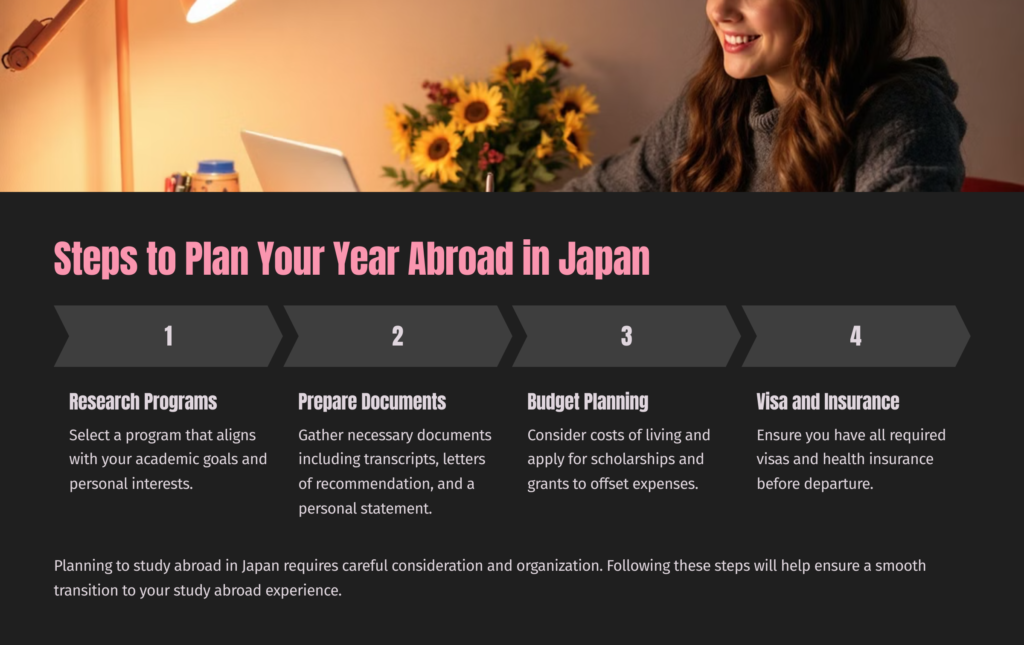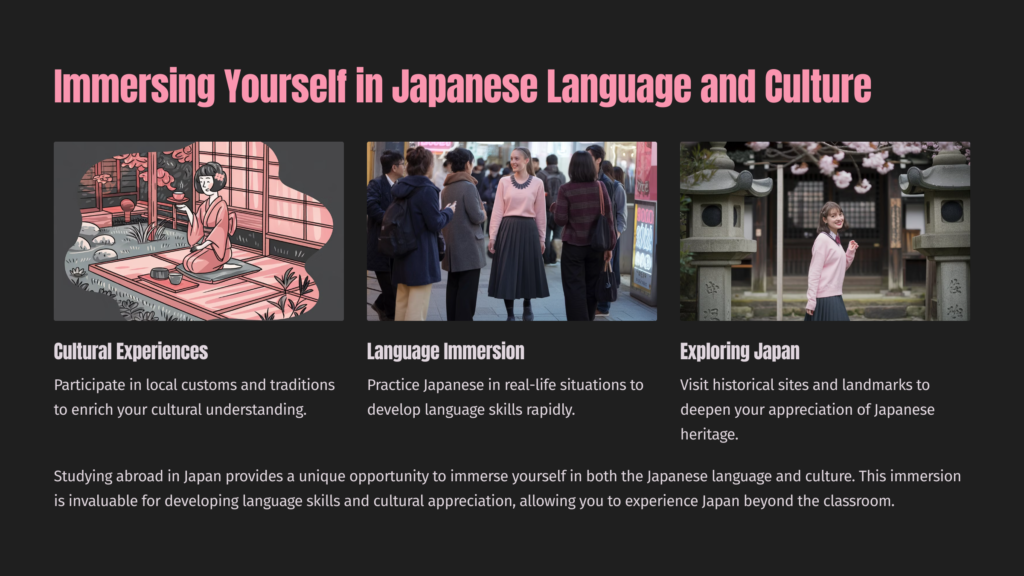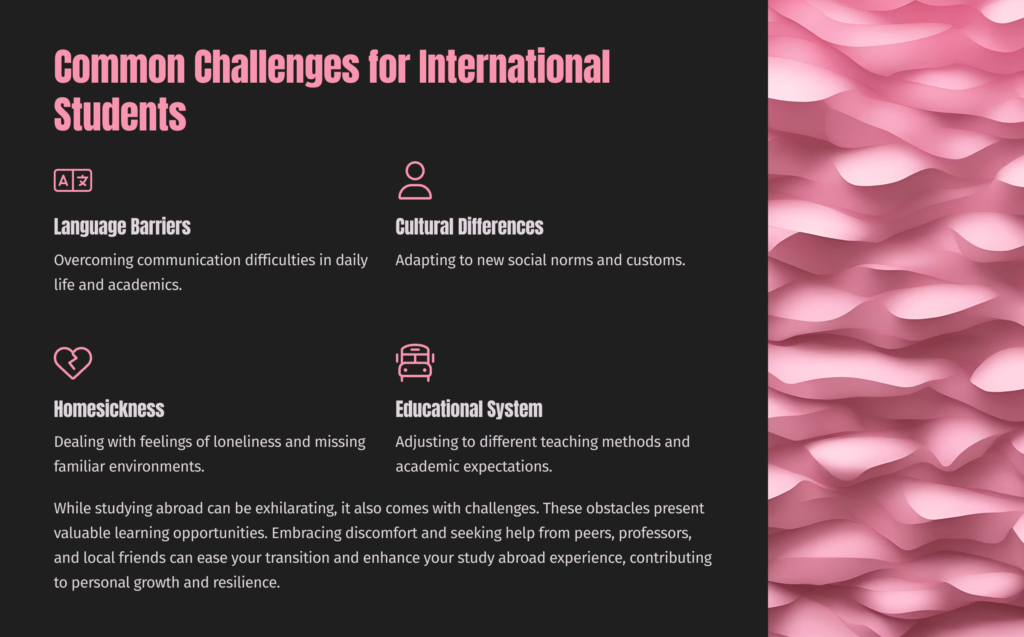Explore Study Abroad Programs in Japan | Enrich Your Global Experience
Studying abroad in Japan is an enriching opportunity that allows students from around the world to immerse themselves in the unique blend of traditional and modern cultures. With its rich history, advanced technology, and vibrant urban life, Japan serves as a captivating study abroad destination. Whether you are considering a summer study program or a full academic year, the options available are diverse and tailored to meet the needs of international students. This article will explore the best study abroad programs in Japan, how to plan your experience, what to expect while studying Japanese abroad, frequently asked questions, and tips to make the most of your time in this fascinating country.
What Are the Best Study Abroad Programs in Japan?
Top Study Abroad Programs for College Students
When it comes to study abroad programs in Japan, various universities and institutions offer tailored experiences for college students. Programs like KCP International are renowned for their comprehensive curriculum that focuses on Japanese language skills and cultural immersion. This program allows students to study Japanese intensively while living in Tokyo, providing a perfect environment to practice your Japanese with local Japanese speakers. Similarly, other universities offer summer study options that allow participants to explore Japan’s rich cultural heritage while enhancing their academic pursuits. Each program provides unique opportunities that cater to different academic interests, particularly in humanities and social sciences.

Choosing Between Tokyo, Kyoto, and Osaka
Choosing where to study in Japan is a critical decision that can significantly impact your study abroad experience. Tokyo, as the bustling capital, offers a vibrant nightlife and a mix of traditional and contemporary attractions. If you prefer a city steeped in history, Kyoto is an excellent choice, known for its beautiful temples and preservation of Japanese culture. Osaka, on the other hand, is famous for its delicious cuisine and friendly atmosphere. Each city has its distinct character and opportunities for exploration, making it essential to consider what type of environment will best support your academic and personal growth during your year abroad.
Internship Opportunities During Your Study Abroad Program
Incorporating internship opportunities into your study abroad program can greatly enhance your experience. Many universities in Japan provide avenues to connect international students with local businesses and organizations. These internships can range from positions in educational institutions to roles in technology firms, allowing you to gain practical experience while immersing yourself in Japanese language and culture. Engaging in internships not only strengthens your resume but also helps you build a network of professional contacts in Japan, which can be invaluable for your future career.

How to Plan Your Study Abroad Experience in Japan?
Steps to Plan Your Year Abroad in Japan
Planning to study abroad in Japan requires careful consideration and organization. The first step is to research and select a program that aligns with your academic goals and personal interests. Once you identify a suitable program, prepare the necessary documents for your application, including transcripts, letters of recommendation, and a personal statement. It is also essential to budget for your stay, as the cost of living can vary significantly between cities. Consider applying for scholarships and grants that can help offset tuition and living expenses. Lastly, ensure you have all required visas and health insurance before your departure.

Essential Tips for Studying Abroad in Tokyo
Tokyo is a bustling metropolis filled with opportunities for exploration and learning. To make the most of your study abroad experience in Tokyo, familiarize yourself with public transport systems, as they are efficient and widely used. Learning basic phrases in Japanese will also enhance your interaction with locals and help you navigate daily life. Furthermore, seeking out local cultural events and festivals can provide insight into traditional Japanese customs. Engage with your classmates and participate in extracurricular activities to build friendships and expand your network during your time abroad in Tokyo.
Language Schools and Courses to Consider
If your primary focus is to improve your Japanese language skills, enrolling in a reputable language school is crucial. Many institutions offer specialized courses designed for international students, ranging from beginner to advanced levels. These courses often include immersive experiences, such as conversational practice with local Japanese speakers and cultural excursions. Engaging in these language schools not only enhances your Japanese language proficiency but also deepens your understanding of Japanese culture, creating a more rounded study abroad experience.
What Can You Expect When Studying Japanese Abroad?
Immersing Yourself in Japanese Language and Culture
Studying abroad in Japan provides a unique opportunity to immerse yourself in both the Japanese language and culture. The moment you arrive, you will be surrounded by the daily use of Japanese, from street signs to conversations in cafes. This immersion is invaluable for developing language skills, as it encourages you to practice your Japanese in real-life situations. Additionally, participating in local customs and traditions, such as tea ceremonies or festivals, enriches your cultural understanding and appreciation, allowing you to experience Japan beyond the classroom.

Common Challenges for International Students
While studying abroad can be an exhilarating experience, it also comes with challenges. International students might face language barriers, cultural differences, and homesickness. Adapting to a new educational system can also be daunting, particularly if you’re studying in Japanese. However, these challenges present valuable learning opportunities. Embracing the discomfort and seeking help from peers, professors, and local friends can ease your transition and enhance your study abroad experience. Overcoming these obstacles will contribute to personal growth and resilience.

Benefits of Learning the Japanese Language
Learning the Japanese language offers numerous benefits, particularly when studying abroad. Proficiency in Japanese can enhance your academic experience, as it allows you to access a wider range of resources and engage more deeply with your studies. Furthermore, strong Japanese language skills can improve your employability in international job markets, especially in fields related to Japan’s economy. Additionally, the ability to converse with locals enriches your travel experiences and fosters meaningful connections, making your time abroad more rewarding.
What Are the Frequently Asked Questions About Studying in Japan?
What Is the Cost of Studying Abroad in Japan?
The cost of studying abroad in Japan can vary depending on several factors, including the city you choose to study in and the type of program you enroll in. Generally, tuition fees for Japanese universities are competitive when compared to institutions in other countries. However, living expenses in cities like Tokyo can be high. It is crucial to budget accordingly, factoring in accommodation, food, transportation, and leisure activities. Exploring study abroad scholarships can also provide financial support to help manage costs.
How to Find a Good Place to Study Abroad?
Finding a good place to study abroad begins with thorough research. Look for programs that have a solid reputation and offer courses that align with your academic interests. Read reviews from previous students and consult advisors at your home institution for recommendations. Additionally, consider the location and culture of the city you wish to live in, as this will influence your overall experience. Engaging with alumni from your prospective programs can provide valuable insights into what to expect and help you make an informed decision.
What Is the Admission Process for Japanese Universities?
The admission process for Japanese universities typically involves submitting an application form, academic transcripts, letters of recommendation, and proof of language proficiency. Some programs may also require a personal interview or statement of purpose. It is essential to check the specific requirements for each institution, as they can vary. Early preparation and attention to detail are crucial for a successful application. Many universities also offer an open campus block program, allowing prospective students to visit and experience the school environment before applying.
How to Make the Most of Your Time Abroad in Japan?
Exploring Japanese Culture Beyond the Classroom
To fully benefit from your study abroad experience, it is essential to explore Japanese culture beyond the classroom. Take the time to visit historical sites, such as temples in Kyoto or museums in Tokyo, to gain a deeper understanding of Japan’s rich heritage. Engaging in local activities, such as cooking classes or martial arts, can provide unique insights into everyday Japanese life. These experiences will not only enhance your language skills but will also create lasting memories and connections with the people and culture of Japan.
Engaging in Local Festivals and Events
Japan is known for its vibrant festivals and events, which provide excellent opportunities for cultural immersion. Participating in local festivals allows you to experience traditional music, dance, and cuisine while interacting with local residents. These events often celebrate the changing seasons or historical events and offer a glimpse into the community spirit of the Japanese people. Engaging in these festivities during your time abroad will enrich your understanding of Japanese culture and create unforgettable memories.
Finding Internships and Part-Time Work Opportunities
While studying abroad, finding internships or part-time work opportunities can enhance your experience and provide financial support. Many universities offer career services that can assist international students in securing internships relevant to their field of study. Additionally, exploring local job boards and networking within your academic community can open doors to part-time positions. Engaging in work experiences will not only improve your Japanese language skills but also allow you to build professional connections and gain practical experience in a global context.

